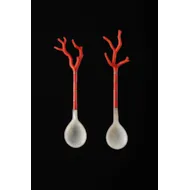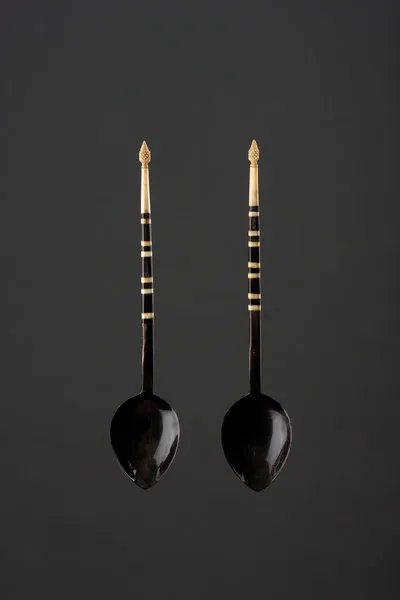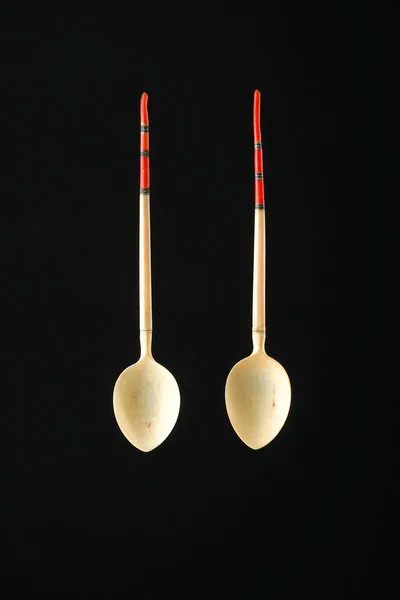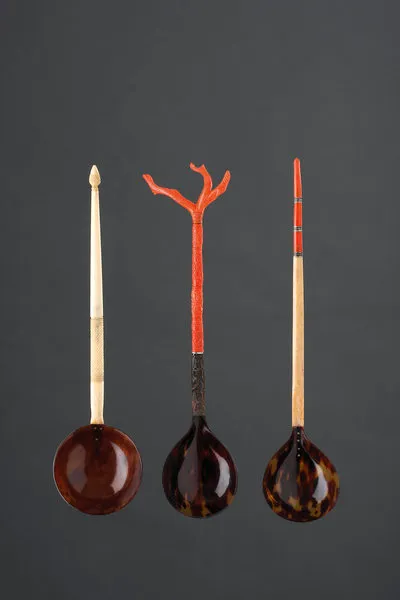A Collection of Nine Fine Ottoman Turkish Sherbet Spoons
A Collection of Nine Fine Ottoman Turkish Sherbet Spoons
A. A superb pair of sherbet spoons with carved mother of pearl bowls and branched red coral handles inlaid with silver
B. A fine pair of sherbet spoons with carved walrus ivory bowls and stems with red coral finials
C. A single sherbet spoon with a wide tortoise shell bowl and a carved whalebone and silver inlaid red coral stem
D. An unusual pair of carved black goat horn sherbet spoons with striated whalebone and horn stems with carved whalebone finials
E. A superb and substantial tortoise shell and red coral sherbet spoon, the stem profusely carved in the round with tulips and floral arabesques
F. A single sherbet spoon of plain form with a tortoise shell bowl and a faceted whalebone stem with carved finial
Early 19th Century
Size: 26cm long – 10¼ ins long (max) 22.5cm long – 9 ins long (min)
A. A superb pair of sherbet spoons with carved mother of pearl bowls and branched red coral handles inlaid with silver
B. A fine pair of sherbet spoons with carved walrus ivory bowls and stems with red coral finials
C. A single sherbet spoon with a wide tortoise shell bowl and a carved whalebone and silver inlaid red coral stem
D. An unusual pair of carved black goat horn sherbet spoons with striated whalebone and horn stems with carved whalebone finials
E. A superb and substantial tortoise shell and red coral sherbet spoon, the stem profusely carved in the round with tulips and floral arabesques
F. A single sherbet spoon of plain form with a tortoise shell bowl and a faceted whalebone stem with carved finial
Early 19th Century
Size: 26cm long – 10¼ ins long (max) 22.5cm long – 9 ins long (min)
The word sherbet comes from the classical Arab term for a cold sweetened drink, ‘Sharí¢b’ which is non-alcoholic. However, in the late middle ages this word developed its current Arabic sense of an alcoholic drink so a different word was needed for the non-alcoholic sweetened beverage and this emerged as ‘Sharbí¢t’. The Turkish term sherbet comes from this more recent Arabic word. In the 16th century its use entered Italian cuisine under the name ‘Sorbetto’ derived from the Italian verb ‘Sorbire’ meaning to sip. This gave rise to the French ‘Sorbet’ and the Spanish ‘Sorbete’ all of which begin with an ‘S’ and not ‘Sh’. English is the only language, which took the word sherbet directly from the Turkish complete with its ‘h’.
A Collection of Nine Fine Ottoman Turkish Sherbet Spoons

SOLD






